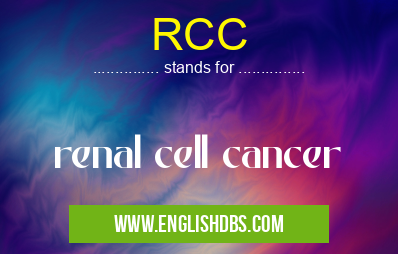What does RCC mean in MEDICAL
RCC stands for renal cell cancer, which refers to a type of cancer that begins in the cells in the tubules of the kidney. This is also referred to as renal adenocarcinoma and hypernephroid carcinoma, and it is the most common type of kidney cancer in adults. It can be found in any age group but is more frequent in older adults. When detected early, RCC can often be treated successfully; however, if left untreated, it can lead to life-threatening complications.

RCC meaning in Medical in Medical
RCC mostly used in an acronym Medical in Category Medical that means renal cell cancer
Shorthand: RCC,
Full Form: renal cell cancer
For more information of "renal cell cancer", see the section below.
Causes
The exact cause of RCC is not known; however, there are certain predisposing factors that may increase one's risk for developing this disease. Some conditions that could put someone at higher risk include obesity, family history of kidney disease or cancer, prior radiation therapy to the abdominal area or having had an organ transplant involving the kidney. In addition, some research suggests that long-term exposure to certain toxins such as asbestos or cadmium may also increase one's risk for developing RCC.
Symptoms
In its early stages, RCC may not cause any symptoms at all because it is usually found incidentally on imaging exams done for other reasons. However, as the tumor grows larger it can cause a number of symptoms including blood in the urine (hematuria), a mass or lump felt on the side of abdomen or back (flank mass), fatigue due to anemia (low red blood cell count) related to bleeding within the tumor, pain (in advanced cases) and an enlarged abdomen due to fluid buildup from blocked lymphatic vessels normally present within normal kidneys.
Diagnosis
RCC is typically diagnosed through imaging techniques such as a computed tomography scan (CT scan) or ultrasound which reveals an abnormality that might be suspicious for cancer. Other tests may then be performed including cystoscopy and biopsy to confirm the diagnosis and determine how advanced the disease is prior to initiating treatment options such as surgical removal of part or all of a kidney depending on extent of spread/invasion beyond one lobe/tissue compartment (partial nephrectomy) versus full removal of entire involved kidney (radical nephrectomy).
Treatment
The treatment strategy used for RCC depends on multiple factors including stage and size at diagnosis as well as patient age and comorbidities such as diabetes mellitus or hypertension. Generally speaking nephrectomy remains a mainstay regardless of stage with adjuvant therapies including targeted systemic drug therapy consisting mainly tyrosine kinase inhibitors with antiangiogenic properties as well as immuno-oncology treatments being employed based on traditional clinical parameters like tumor stage & grade along with some specific biomarkers like pAXL expression status etc.
Essential Questions and Answers on renal cell cancer in "MEDICAL»MEDICAL"
What is kidney cancer?
Kidney cancer, also known as renal cell cancer, refers to any type of malignant tumor that originates in the kidney. The most common type of kidney cancer is renal cell carcinoma, which begins in the cells lining the tiny tubes within the kidney
Final Words:
Renal cell cancer is a serious condition that requires prompt diagnosis and treatment when discovered. Early detection gives patients better outcomes than those who are diagnosed later because their tumors have been able to grow larger AND spread beyond their original location within A random lobe/compartment of their affected Kidney(s). Furthermore advances made in targeted systemic therapies over past several years have drastically improved quality & length Of life For many RCC patients making it essential for clinicians To remain Up-to-date regarding New therapeutic strategies & technologies available For Treating this Complex malignancy.
RCC also stands for: |
|
| All stands for RCC |
